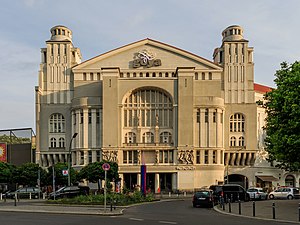
The Metropol, formerly Neues Schauspielhaus (English: New Theatre), at 5 Nollendorfplatz in the Schöneberg district of Berlin was built in 1905 as a theatre, with a separate concert hall (the Mozartsaal) above, in the then-fashionable Art Nouveau style. In 1911 the Mozartsaal was converted into a cinema with 925 seats.
From the beginning of World War I the theatre turned into an operetta stage until in 1927, Erwin Piscator and Tilla Durieux opened their Theater am Nollendorfplatz in the building. Piscator created critical performances by playwrights like Ernst Toller and Walter Mehring, with artists like Bertolt Brecht, George Grosz and John Heartfield at times working with him. Piscator's theater went bankrupt in 1929, and he emigrated in 1931. After the Nazi takeover the house became an operetta theatre once again, now under the direction of Harald Paulsen.
While the auditorium was destroyed in World War II, the facade as well as the cinema survived and in 1951 was renamed the Metropol. Since 1977 it has been used as a discothèque and became a famous music club during the 1980s heyday of West Berlin, frequented by bands like Depeche Mode, Morrissey, The Cross, The Human League and Front 242. For a short time in 2000 it was the location of the KitKatClub and in 2005 the architect Hans Kollhoff remodeled the interior as the Goya night club. In 2019 it was reopened as the Metropol.
Cultural references
Wim Wenders's 1987 film Wings of Desire includes a segment filmed during a Nick Cave concert in this venue. Dario Argento and Lamberto Bava used the building (and the existing logo of the Metropol-discotheque) in Demons.
References
- Bentinck, Tim (June 1975). The development of the cinema in Berlin since 1900 (Thesis, University of East Anglia). (updated 2013). Retrieved 10 October 2016.
- Goergen, Jeanpaul (10 June 1999) Als das Kino noch Amor hieß (in German). Die Welt. Retrieved 6 January 2016.
- There was cinema just across the road at number 4, called the Ufa-Theater am Nollendorfplatz from 1924 to 1927, with which it is sometimes confused.
External links
52°29′56″N 13°21′10″E / 52.49889°N 13.35278°E / 52.49889; 13.35278
This article about a Berlin building or structure is a stub. You can help Misplaced Pages by expanding it. |